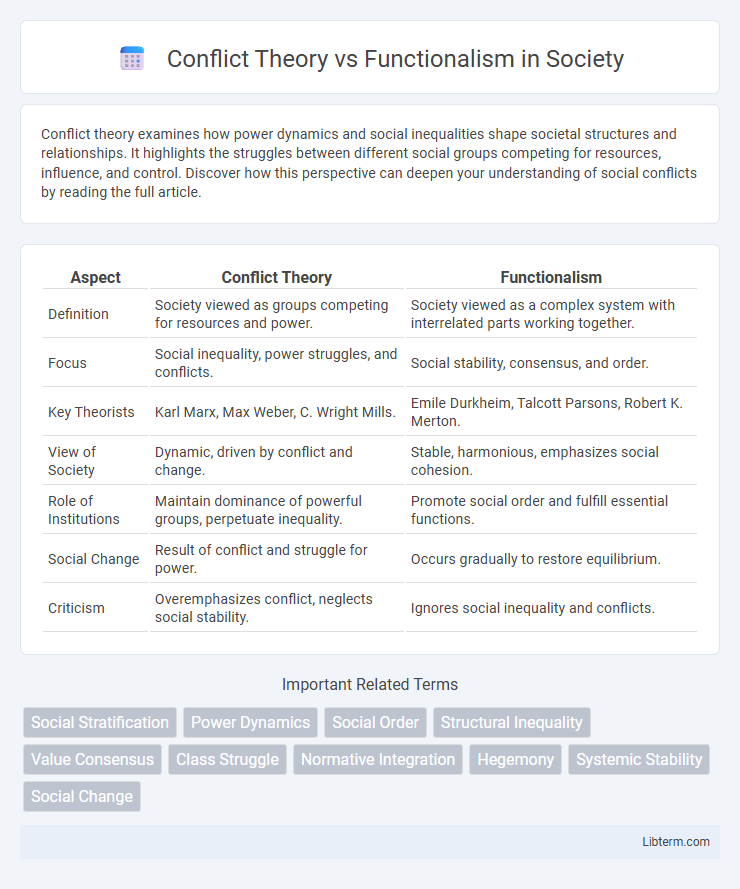Conflict theory examines how power dynamics and social inequalities shape societal structures and relationships. It highlights the struggles between different social groups competing for resources, influence, and control. Discover how this perspective can deepen your understanding of social conflicts by reading the full article.
Table of Comparison
| Aspect | Conflict Theory | Functionalism |
|---|---|---|
| Definition | Society viewed as groups competing for resources and power. | Society viewed as a complex system with interrelated parts working together. |
| Focus | Social inequality, power struggles, and conflicts. | Social stability, consensus, and order. |
| Key Theorists | Karl Marx, Max Weber, C. Wright Mills. | Emile Durkheim, Talcott Parsons, Robert K. Merton. |
| View of Society | Dynamic, driven by conflict and change. | Stable, harmonious, emphasizes social cohesion. |
| Role of Institutions | Maintain dominance of powerful groups, perpetuate inequality. | Promote social order and fulfill essential functions. |
| Social Change | Result of conflict and struggle for power. | Occurs gradually to restore equilibrium. |
| Criticism | Overemphasizes conflict, neglects social stability. | Ignores social inequality and conflicts. |
Introduction to Sociological Perspectives
Conflict theory emphasizes social inequality and power struggles as central to societal dynamics, highlighting how dominant groups maintain control over resources. Functionalism views society as a complex system with interdependent parts working together to promote stability and social order. These perspectives provide foundational frameworks for analyzing social structures and institutions within sociology.
Defining Conflict Theory
Conflict Theory defines society through the lens of power struggles and inequalities, emphasizing how dominant groups exploit resources to maintain control. It contrasts sharply with Functionalism, which views society as a system of interrelated parts working harmoniously to promote stability and social order. Conflict Theory highlights social change as a result of tensions and conflicts between competing interests.
Defining Functionalism
Functionalism defines society as a complex system whose parts work together to promote stability, social order, and cohesion. Each element of society, such as institutions, norms, and roles, serves a specific function that contributes to the overall equilibrium and continuity. This perspective emphasizes the interdependence of social structures and their role in maintaining societal health and functionality.
Historical Origins and Key Theorists
Conflict Theory originated in the mid-19th century with Karl Marx's analysis of class struggle and economic inequality, emphasizing power disparities and social change driven by conflict. Functionalism, developed by Emile Durkheim and later expanded by Talcott Parsons, emerged in the early 20th century, focusing on social order and stability through interconnected institutions that maintain societal equilibrium. Both theories offer foundational frameworks in sociology, with Marx highlighting economic conflict and Durkheim and Parsons underscoring structural consensus.
Core Assumptions of Conflict Theory
Conflict Theory asserts that society is structured around power struggles between dominant and subordinate groups, emphasizing inequality and social change driven by conflict. It assumes that resources and opportunities are distributed unequally, creating tensions that challenge social order and reinforce class divisions. The theory highlights how social institutions perpetuate domination and maintain the interests of privileged groups over marginalized populations.
Core Assumptions of Functionalism
Functionalism assumes society is a complex system whose parts work together to promote stability and social order, emphasizing consensus and shared norms. It posits that social institutions such as family, education, and government serve essential functions to maintain societal equilibrium. Functionalists view conflict as an abnormal state resulting from dysfunctions, rather than a fundamental aspect of social life.
Major Differences Between Conflict Theory and Functionalism
Conflict theory emphasizes the role of power struggles and inequality in shaping society, highlighting how dominant groups exploit subordinate ones to maintain control. Functionalism views society as a system of interconnected parts functioning together harmoniously to maintain social stability and order. The major difference lies in conflict theory's focus on social change driven by conflict, whereas functionalism stresses social cohesion and the contribution of each part to societal equilibrium.
Applications in Contemporary Society
Conflict Theory illuminates power disparities and social inequalities manifesting in issues like wealth distribution, racial discrimination, and labor rights protests in contemporary society. Functionalism highlights the role of social institutions, such as education, family, and government, in maintaining societal stability and cohesion through shared norms and values. Both perspectives offer critical insights for analyzing social policies, workplace dynamics, and systemic reforms in a complex, interconnected modern world.
Strengths and Criticisms of Each Theory
Conflict Theory highlights power disparities and social inequalities, emphasizing how dominant groups maintain control and perpetuate systemic injustice; its strength lies in exposing class struggles and social change dynamics, but it is often criticized for overlooking social cohesion and stability. Functionalism emphasizes the interdependence of social institutions and their role in maintaining societal equilibrium, offering a comprehensive view of social order and cohesion; however, it faces criticism for downplaying social conflict and justifying the status quo. Both theories provide valuable perspectives: Conflict Theory drives awareness of inequality while Functionalism explains social order, but each requires integration to fully understand complex social realities.
Conclusion: Choosing a Theoretical Lens
Selecting a theoretical lens between Conflict Theory and Functionalism hinges on the research focus; Conflict Theory emphasizes power dynamics and social inequalities, while Functionalism highlights social stability and cohesion. Researchers prioritizing systemic change and critique of oppression may align with Conflict Theory, whereas those examining social order and interrelated institutions often prefer Functionalism. Understanding the strengths and limitations of each framework enables a nuanced analysis of social phenomena.
Conflict Theory Infographic

 libterm.com
libterm.com